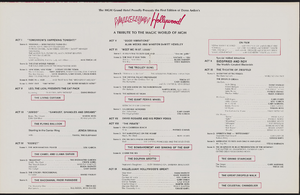Search the Special Collections and Archives Portal
Search Results
United States: Las Vegas and Reno, 1950s-1990s
Level of Description
Scope and Contents
The United States--Las Vegas and Reno subseries dating from the 1950s to the 1990s, documents shows produced by Donn Arden in Las Vegas, Nevada, and Reno, Nevada. Shows represented are
Archival Collection
Collection Name: Donn Arden Papers
Box/Folder: N/A
Archival Component
Fluff LeCoque oral history interviews
Identifier
Abstract
Oral history interviews with Fluff LeCoque conducted by Joyce Marshall on May 05, 1992 and May 21, 1992 for the UNLV University Libraries Oral History Collection. In these interviews, LeCoque discusses her early life in Montana and her career as a dancer. She talks about moving to Las Vegas, Nevada in 1947, singing at the Last Frontier Hotel with the Chuck Gould Orchestra, and traveling around the world in a dance troupe. LeCoque remembers performing at the Moulin Rouge in Los Angeles, California and working with Donn Arden. Later, LeCoque recalls dancing in
Archival Collection
Dick Franco oral history interview
Identifier
Abstract
Oral history interview with Dick Franco conducted by Su Kim Chung on July 14, 2021 for the Boyer Early Las Vegas Oral History Project. Richard Francis or Dick Franco, his stage name by which he is more commonly known, has been juggling for over 50 years, having learned the art while he was still in high school. Taught by prominent juggling legends in Vaudeville and Las Vegas, Franco would go on to perform all over the world. He began as an opening act with the Harlem Globetrotters in the US, but he then traveled Europe and was featured in variety and production shows in Blackpool, London, Monte Carlo, and Berlin among others.
Franco won specialty awards in Monte Carlo and Paris for his juggling prowess. In the US, Franco performed extensively in Las Vegas at the shows Hallelujah Hollywood, Lido de Paris, Folies Bergere and Jubilee. He then performed many shows in Branson, MO before becoming an entertainment agent and producer in Las Vegas. His wife and daughter traveled all over the world with him and both would perform in his acts.
Archival Collection
Hansen, Tom
Choreographer Tom Hansen worked on the Jubilee! production show at the MGM Grand Hotel and other stage shows in Las Vegas, Nevada with noted producer Donn Arden; famous for his work on the Lido de Paris, Hallelujah Hollywood, Jubilee! and others.
Person

Transcript of interview with Dr. Fiona Kelley by Lisa Gioia-Acres, March 21, 2009
Date
Archival Collection
Description
Dr. Fiona Kelley was born and raised in Connecticut. Her parents were both teachers (though her mother quit teaching to raise their two daughters), and Fiona recalls the European vacations the family took every summer, exploring castles and enjoying picnic lunches. Fiona was educated at Greenwich Academy in Connecticut and Bard College (dance major with art history minor) in New York. She mentions dancing in Acapulco and California and then auditioning and being hired as a cover dancer for Hallelujah Hollywood! at the MGM in Las Vegas. Meanwhile, she had also become licensed in massage and states that as she was making the transition from dancing to production of dance, she and her husband were invited to China. While in China, Dr. Kelley recalls visiting a hospital which specialized in the treatment of AIDS through acupuncture. This led to a decision to learn Oriental medicine, which she pursued once she returned to the United States. She shares many details of her studies
Text
Ffolliott "Fluff" LeCoque Papers
Identifier
Abstract
Collection is comprised of Ffolliott "Fluff" LeCoque's professional and personal papers (1879-2015), documenting her life and career working as a dancer and later as company manager for Las Vegas entertainment productions; most notably the long-running Jubilee! show produced by Donn Arden for the MGM Grand and Bally's Hotel-Casinos. Materials include personal letters, drawings, professional papers, newspaper clippings, photographs, magazines, commericially produced sheet music, and related ephemera.
Archival Collection




